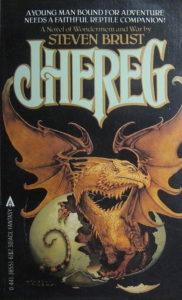Writing this at the end of a long weekend, one which was both productive and quite lazy.
We had a warm Saturday which prompted Debbi to take the covers off our patio furniture at last. It’s pretty durable stuff, but we were happy with the waterproof protection of the covers during the winter rainy season (such as it was – California is in another bad drought), and we didn’t get any critters nesting in the furniture when we removed it.
Consequently it was so warm that we spent most of Saturday afternoon sitting on the sofa outdoors under the umbrella and reading (in between wasting time on our iPads, of course). We left the doors to the family room open (with the retractable screen in place), so the cats got to have the full outdoor-smells experience. I don’t think the kittens are quite used to us being around but not indoors, but neither of them tries to go out (Simon definitely does not want to go out), so it’s fine.
In the evening we played Jackbox Games with friends and family – which we’ve been doing regularly throughout the pandemic – followed by me going out for a walk.
Sunday we also spent a bunch of time outside, but I also did some yard work since it cooled off to reasonable levels. I finally replaced the transformer for our low-power accent lights outside, which went really well, and I honestly probably spent more time practicing stripping the wires than anything else. I also re-staked a couple of the lights and replaced some bulbs, and it made me feel like a real homeowner.
Then I assembled my new extension pruner (the old one having seized up last summer) and filled up our yard waste bin with trimmings from the plum tree. Our yard is maybe 20% larger than I have the energy to take care of, and so it’s been slowly getting away from me over the 11 years we’ve lived here. I expect we’ll re-landscape sometime in the next couple of years.
I took today off and Debbi took the afternoon off. After lunch at nearby sandwich joint Specialty’s, we went to see our first movie in the cinemas in over 2 years – for which we were joined by exactly three other people, who all sat behind us. We saw Doctor Strange in the Multiverse of Madness. I’m not going to write a full review, but I enjoyed it overall. People who enjoyed Wanda’s (Elizabeth Olsen) character development in WandaVision will probably enjoy it here as well – I personally did not, though since it wasn’t her film, I can live with it. I enjoyed seeing Benedict Cumberbatch’s Strange as a more experienced sorcerer, yet I thought he had some good character development. They didn’t quite stick the landing on that character development, instead taking things in a suddenly-different direction, so that was disappointing. Xochitl Gomez as America Chavez and Rachel McAdams as Christine Palmer were both great. There was a bunch of fan service nonsense in the middle which was fine as far as moving the story along and setting up a big set-piece, but honestly since I thought the Illuminati in the comics were stupid, I’m glad they didn’t make more of it than they did. The film’s sense of humor works sometimes but feels awkwardly bolted-on at other times. I sort of agree with Kurt Busiek’s take in this Twitter thread, though I think I liked it more than he did. But the script probably needed a couple more rewrites to completely work.
Anyway, it’s a dark and sometimes very grim film, and I think they really missed an opportunity for closure and optimism at the end by not having Strange more directly talk to the one person he really owed some emotional honesty to. A solid mid-range MCU film, sort of the dark version of Guardians of the Galaxy. If they’d clung more firmly to the theme of “learning to love yourself” (the flip side of Guardians’ found-family theme) and followed it through then I think it’d have worked better.
Hey, I guess I did write a review.
Anyway, I’m sitting on the back porch again writing this while Debbi plays (different) games with friends, and I think we’re going to QBB for drinks and barbecue afterwards. So it’s been a good weekend.

